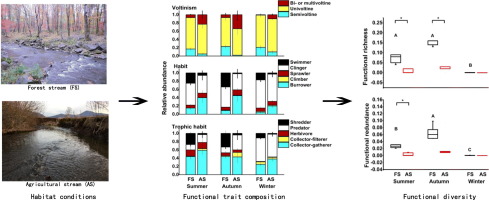Science of the Total Environment ( IF 8.2 ) Pub Date : 2019-04-18 , DOI: 10.1016/j.scitotenv.2019.04.272 Lu Wang , Yingzhi Gao , Bo-Ping Han , Haijuan Fan , Haijun Yang

|
The species composition of macroinvertebrate communities is sensitive to environmental changes. However, the influence of human activity over seasons on the functional characteristics of macroinvertebrate communities is poorly understood. To elucidate the effects of agriculture-induced environmental changes on stream ecosystems in cold regions, we conducted a comparative study of an agricultural stream and a forest stream in the Changbai Mountains in northeast China in the summer, autumn, and winter of 2016. Our results showed that agriculture had significant effects on the species and functional composition. Although some sensitive species with “Swimmer” and “Shredder” traits disappeared, there was a significant increase in species with resilience and resistance traits such as “Bi- or multivoltine” in the agricultural stream. This result was attributed to the effects of agricultural practices on habitat stability, heterogeneity of habitats, water quality, and material cycling of the stream ecosystems. Furthermore, functional richness and functional divergence decreased in the agricultural stream, reflecting the strong effects of agricultural disturbance on the resource-use efficiency and functional diversification of communities. In particular, community stability also showed significant decrease in the agricultural stream in the summer, implying a stronger disturbance during this season. Generally, the functional traits and biodiversity of both streams had significant seasonal dynamics. The decrease in biodiversity in the winter indicated that low temperature and freezing are additional critical factors affecting the stability of stream ecosystems in cold regions.

















































 京公网安备 11010802027423号
京公网安备 11010802027423号